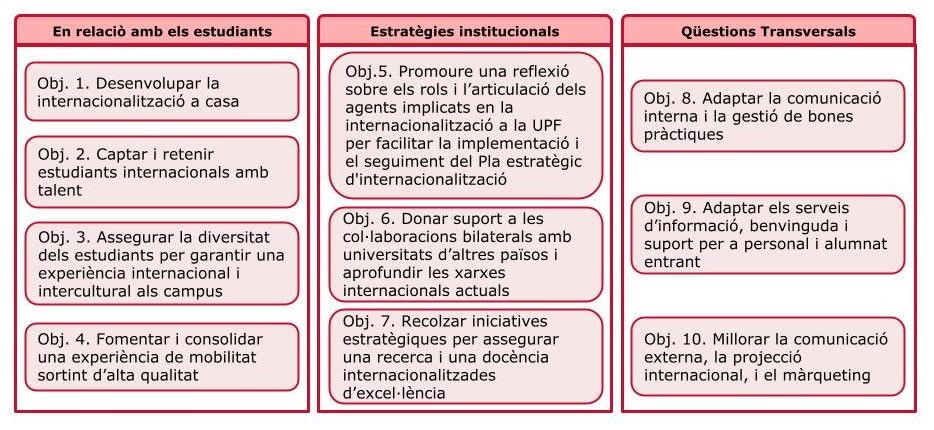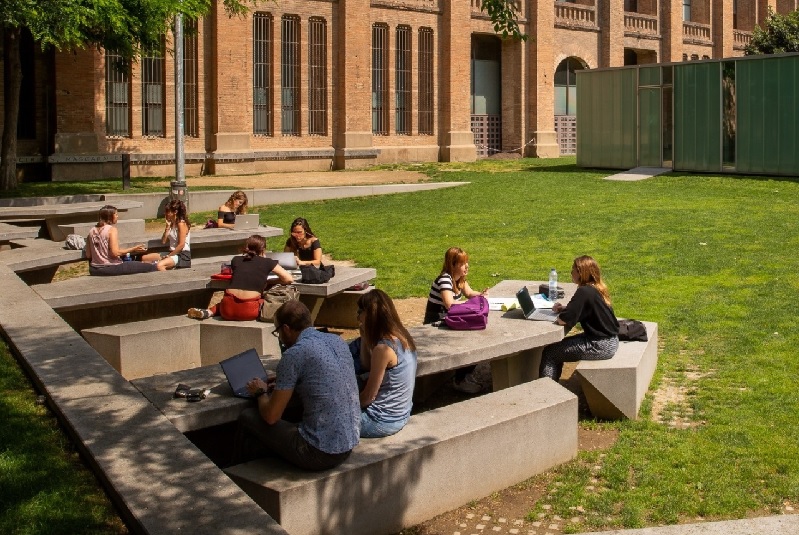The process of developing a new strategic model for UPF’s internationalization completed
The University has worked breaking new ground to structure internationalization from a cross-cutting standpoint, placing it at the centre of its institutional project and as a strategic driving force. One of the most important elements of the new model is students’ “internationalization at home”, whereby they can enjoy a more inclusive international experience without leaving UPF.

Pompeu Fabra University has completed a process of critically analysing the situation of internationalization at the institution, but especially the set of guidelines for building a strategic model based on the values of UPF and on its aspirations, sufficiently flexible to adapt and to accompany the University’s comprehensive project in the coming years.
The document of UPF’s new strategic model for internationalization presents a comprehensive account of what is understood, at the institution and as a community, by “internationalization”, emphasizing the need to develop a conceptual framework as well as model for its operating and management. A proposal linked to other institutional areas and initiatives, such as EDvolution, the new educational framework, or Planetary Wellbeing, with which it shares goals, and which reinforce each other.
“While the UPF Strategic plan up to 2025 includes internationalization as a cross-cutting axis, which affects all functions of the University, the process we have been working on has confirmed that internationalization is also a strategic area in itself, subject today more than ever to far reaching conceptual transformations: the old model of the university diplomacy of bilateral agreements has given way to a far more pronounced structurally complex model”, explains Isabel Valverde, vice-rector for internationalization projects.
“While the UPF Strategic plan up to 2025 includes internationalization as a cross-cutting axis, which affects all functions of the University, the process we have been working on has confirmed that internationalization is also a strategic area in itself, subject today more than ever to far reaching conceptual transformations”
The process of shared reflection, which began in November 2018, with a conference by professor Francis Vérillaud, director of International Affairs at Sciences Po (Paris), has been developed through working meetings with the International Relations Committee, involving representatives of all bodies of the University and all academic areas, plus a round of interviews and consultations to which other members of the UPF community were invited to glean their different viewpoints.
According to Isabel Valverde, “as is stated in the strategic document, the starting point was the conviction that becoming a truly internationalized, global university will not happen spontaneously, but requires an explicit desire that is shared at all levels, a conscious and consistent effort at institutional level, with a strategic scope”.
The vice-rector stresses the need to define and agree on the significance of internationalization with an integrated vision that allows for coordinated action in which the community as a whole is reflected, placing internationalization at the heart of the vision of UPF as a driving force for the creation of knowledge and reputational capital, with ramifications and insertions in each of its missions.
The document advocates considering internationalization on the same level as fundamental aspects such as teaching, research or teaching staff. The goal is to define a strategic framework that expresses the commitment of the entire university community, teaching and research staff, administration and services staff and students alike.
Participation in networks and associations of prestigious international universities positions UPF internationally
In parallel with reflection and the development of the internationalization plan, this strategic model has been built through participation in “flagship initiatives” that are already positioning UPF internationally, taking advantage of the opportunities on offer in the European arena.
The new map of the European Higher Education Area and research is drawn through alliances and European qualifications. UPF has joined in the EUTOPIA European university pilot project with which the University is changing its scale and opening a new avenue for international growth and institutional transformation through experimentation with and innovation in the educational model.
UPF has also strengthened its European profile by participating in The Guild network formed by 21 European universities that have a more intense focus on research, from sixteen different countries, dedicated to improving the voice of academic institutions, their researchers and students in European discussions on research and innovation) and The Europaeum association, which brings together 18 institutions led by the University of Oxford to carry out projects of excellence in the field of the social sciences and humanities.
The strategic model has been built through participation in “flagship initiatives” that are already positioning UPF internationally, taking advantage of the opportunities on offer in the European arena.
Meanwhile, UPF is actively participating in the new generation of European programmes 2021-2027, with a more international, more inclusive Erasmus, in its promotion of teaching innovation and digitization, and also more connected to the Horizon Europe programme through European universities.
Many of the goals set out in the strategic plan for internationalization are fully aligned with the approach of UPF’s new ECHE charter (the “Erasmus Charter for Higher Education” quality seal that UPF renewed recently with the highest rating), which aims to take advantage of opportunities for mobility and cooperation under the new Erasmus 2021-2027 programme.
“Internationalization at home”, a more inclusive, intercultural experience
According to Isabel Valverde, “the review of UPF’s international programmes has helped overcome a vision of internationalization focusing on mobility and the hitherto prevalent model of programmes for foreigners (Study Abroad)”. Thus, the re-founding of the programmes also lays the foundations for new projects, where “internationalization at home”, which is more inclusive socially for all purposes and more universal, holds a prominent place, and is designed, for example, for students who cannot go abroad: “We must make sure the experience at UPF is international by default, regardless of whether or not you move from Barcelona”, the vice-rector asserts.
Some of the features to achieve this goal of internationalization at home is the desire to attract and retain talented students from around the world, ensuring the diversity of students to safeguard an international, pluralistic experience at the University, and encourage this interculturality on campus.
“We must make sure the experience at UPF is international by default, regardless of whether or not you move from Barcelona”.
One initiative that is a perfect example of this model is the creation of the Barcelona Program for Interdisciplinary Studies (BaPIS), launched in 2020, a commitment to the interdisciplinarity and internationalization of the curriculum at UPF, within a multicultural environment that encourages critical thinking and curiosity as the engines of knowledge and learning. The BaPIS follows the path opened by the Barcelona International Summer School (BISS), founded in 2018, as a benchmark programme to enrich the curriculum of students from UPF and other universities, both from Spain and abroad, in the summer.
A model based on three pillars and ten strategic goals
UPF’s model of internationalization is founded on three pillars and defined through ten goals, each of which includes different actions proposed in order to carry them out:

According to Sara López, head of the International Relations Service, “within each pillar, perhaps the ones involving a deeper load of transformation, due to their impact on different levels of the institution, are the goals related to the commitment to internationalization at home, the adaptation of the organizational structure for more efficient governance, and the management of internal communications and best practices to become an organization that is better prepared and more open to internationalization”.
Particularly in relation to students, developing internationalization at home means going beyond 40% of graduates who enjoy mobility opportunities to reach the remaining 60% in a clear commitment to provide an international experience and exposure to all students at UPF.
A turbulent environment that tests universities’ flexibility and international commitment
The exercise of reflecting on internationalization at UPF coincides with the context of new opportunities offered by the European stage and especially with the challenges that covid-19 has posed, which has meant a radical change in the conditions of teaching and research and in a short time has forced experimenting ways of relating: the effect of the pandemic has served to reflect on internationalization as a widespread phenomenon that is progressing at a relentless pace obeying not just academic mechanisms.

“This situation has allowed us to test our ability to respond and readjust international initiatives without sacrificing our commitment to mobility and innovation. The need for coordination and alignment has also become more evident and urgent, upheld as fundamental objectives of the plan that will have to settle on a political, academic and organizational level in a comprehensive and cohesive vision of internationalization, which is built on the strengths and achievements attained to date”, Isabel Valverde affirms.
The plan goes beyond the effort to rethink the conventional concepts of internationalization and opts to respond to the needs and expectations of UPF at the time it opens in a post-covid scenario, with hegemonic globalization and a time of economic, climate and social crisis around the globe
Thus, according to the vice-rector, the plan goes beyond the effort to rethink the conventional concepts of internationalization and opts to respond to the needs and expectations of UPF at the time it opens in a post-covid scenario, with hegemonic globalization and a time of economic, climate and social crisis around the globe “The process has been seen not only as the internal deliberation required to agree to approaches, but also as an inescapable reflection to put UPF in a position of advantage in the current environment that is being defined”, Isabel Valverde concludes.
